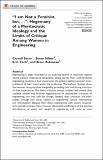| dc.contributor.author | Seron, Carroll | |
| dc.contributor.author | Silbey, Susan S | |
| dc.contributor.author | Cech, Erin | |
| dc.contributor.author | Rubineau, Brian | |
| dc.date.accessioned | 2020-04-08T15:30:29Z | |
| dc.date.available | 2020-04-08T15:30:29Z | |
| dc.date.issued | 2018-03 | |
| dc.identifier.issn | 1552-8464 | |
| dc.identifier.issn | 0730-8884 | |
| dc.identifier.uri | https://hdl.handle.net/1721.1/124529 | |
| dc.description.abstract | Engineering is often described as an enduring bastion of masculine culture where women experience marginality. Using diaries from undergraduate engineering students at four universities, the authors explore women’s interpretations of their status within the profession. The authors’ findings show that women recognize their marginality, providing clear and strong criticisms of their experiences. But these criticisms remain isolated and muted; they coalesce neither into broader organizational or institutional criticisms of engineering, nor into calls for change. Instead, their criticisms are interpreted through two values central to engineering culture: meritocracy and individualism. Despite their direct experiences with sexism, respondents typically embrace these values as ideological justifications of the existing distributions of status and reward in engineering and come to view engineering’s nonmeritocratic system as meritocratic. The unquestioned presumption of meritocracy and the invisibility of its muting effects on critiques resembles not hegemonic masculinity—for these women proudly celebrate their femininity—but a hegemony of meritocratic ideology. The authors conclude that engineering education successfully turns potential critics into agents of cultural reproduction. This article contributes to ongoing debates concerning diversity in STEM professions by showing how professional culture can contribute to more general patterns of token behavior—thus identifying mechanisms of cultural reproduction that thwart institutional change. ©2018 | en_US |
| dc.description.sponsorship | National Science Foundation Grant (no. 0240817) | en_US |
| dc.description.sponsorship | National Science Foundation Grant (no. 0241337) | en_US |
| dc.description.sponsorship | National Science Foundation Grant (no. 0503351) | en_US |
| dc.description.sponsorship | National Science Foundation Grant (no. 0609628) | en_US |
| dc.language.iso | en | |
| dc.publisher | SAGE Publications | en_US |
| dc.relation.isversionof | 10.1177/0730888418759774 | en_US |
| dc.rights | Creative Commons Attribution-Noncommercial-Share Alike | en_US |
| dc.rights.uri | http://creativecommons.org/licenses/by-nc-sa/4.0/ | en_US |
| dc.source | Other repository | en_US |
| dc.title | “I am not a feminist, but. . .”: hegemony of a meritocratic ideology and the limits of critique among women in engineering | en_US |
| dc.type | Article | en_US |
| dc.identifier.citation | Seron, Carroll, Susan Silbey, Erin Cech, and Brian Rubineau, "'I am not a feminist, but. . .': hegemony of a meritocratic ideology and the limits of critique among women in engineering." Work and occupations 45, 2 (March 2018): p. 131-67 doi 10.1177/0730888418759774 ©2018 Author(s) | en_US |
| dc.contributor.department | Massachusetts Institute of Technology. Anthropology Program | en_US |
| dc.relation.journal | Work and occupations | en_US |
| dc.eprint.version | Author's final manuscript | en_US |
| dc.type.uri | http://purl.org/eprint/type/JournalArticle | en_US |
| eprint.status | http://purl.org/eprint/status/PeerReviewed | en_US |
| dc.date.updated | 2019-10-16T18:08:24Z | |
| dspace.date.submission | 2019-10-16T18:08:26Z | |
| mit.journal.volume | 45 | en_US |
| mit.journal.issue | 2 | en_US |
| mit.metadata.status | Complete | |
